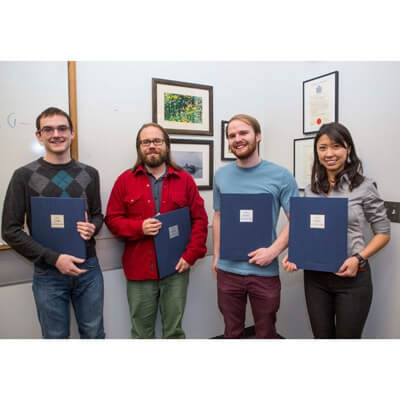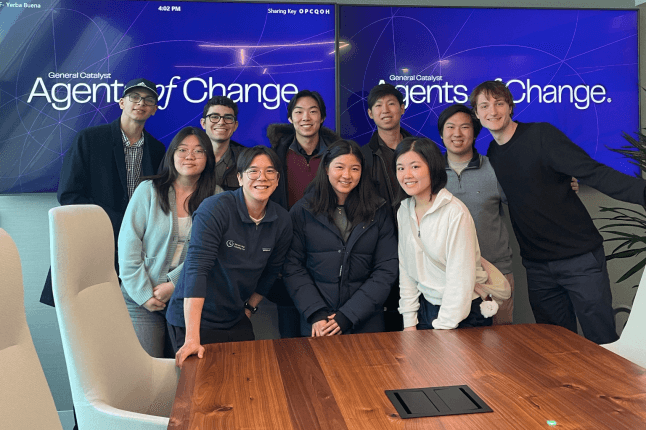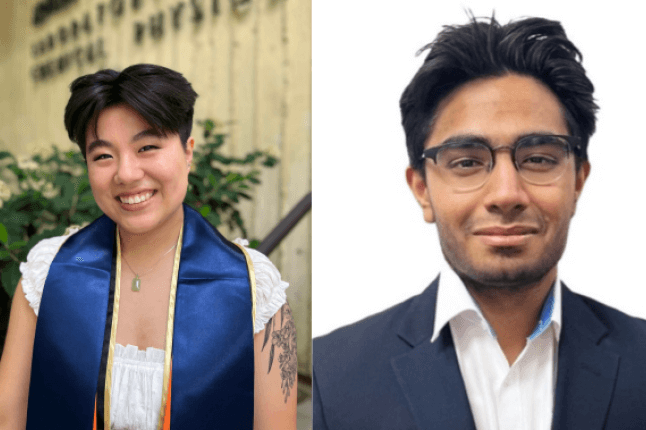News
The Siebel Scholars were honored at a reception in December 2014. (Photo by MaryFran Mitrano, Harvard SEAS.)
Cambridge, Mass. – December 8, 2014 – Five graduate students in computer science at the Harvard School of Engineering and Applied Sciences (SEAS) have been named 2015 Siebel Scholars.
Nathaniel Herman, Daniel Margo, Kevin Schmid, Yakun Sophia Shao, and Steve Tarsa will each receive a $35,000 award for their final year of graduate studies.
They are among 83 selected worldwide from 17 partnering institutions by the Siebel Scholars Foundation, which recognizes the most talented students at the world’s leading graduate schools of computer science, as well as business and bioengineering.
The Siebel Scholars are chosen by the deans of their respective schools on the basis of outstanding academic achievement and demonstrated qualities of leadership. All of the new Siebel Scholars from SEAS are pursuing research that is pushing the boundaries of computer science. On average, Siebel Scholars rank in the top 5% of their class, many within the top 1%.
“Representing the best and brightest from around the globe, these distinguished students join entrepreneurs, researchers, and philanthropists from past Siebel Scholars classes to form an unmatched professional and personal network—bringing together diverse insights and perspectives from business and engineering disciplines at the forefront of solutions to global challenges,” said Thomas M. Siebel, Chairman of the Siebel Scholars Foundation.
Last month, Harvard announced plans to increase the size of its computer science faculty by 50 percent, thanks to an initiative supported by former Microsoft CEO Steve Ballmer ‘77.
Student Biographies
Nathaniel Herman is an A.B./S.M. student with an interest in all things computer science, particularly systems and programming languages research. His current research centers on how to make concurrent programming both easier and highly performant, using ideas related to software transactional memory. He has previously interned at Dropbox, Inc., where he helped improve the photo viewing functionality of the company’s iOS application. Herman has also developed iOS applications of his own including an app that lets users write and run their own code using their iOS device. He also serves as teaching fellow for Harvard’s CS 61, an introductory systems programming course. When not coding, he enjoys rock climbing in outdoor settings and acts as secretary for the Harvard Mountaineering Club, leading students on rock climbing trips in New Hampshire.
Daniel Margo is a computer science Ph.D. candidate whose research focuses on analysis of large complex networks with billions of connections. His dissertation includes the development of an analysis platform for graph-structured data using novel tree decomposition methods. His goal is to achieve efficient computing on graphs that are orders of magnitude larger than what was previously feasible. Margo enjoys teaching and has been a teaching assistant for Harvard's infamously difficult Operating Systems course for four years. He is also interested in the intersection of computer and the social sciences, and spent a semester at Harvard’s Berkman Center for Internet & Society researching censorship resistance technologies. He received his B.A. in Computer Science from Cornell University and his Master’s from Harvard.
Kevin Schmid is an A.B./S.M. computer science student whose current interests include discrete math and algorithms, particularly those with artificial intelligence applications. Recently, he completed a research project that utilized plan recognition techniques to analyze C code of students in an introductory computer science class. Schmid enjoys software development and has worked on an online grading system for an introductory linear algebra and analysis class. During his time at Harvard, he has also served as a section leader for introductory computer science classes. He is a recipient of the Harvard University Certificate of Distinction in Teaching. Last summer, he worked at a financial firm where he focused on optimization of a pricing model used for trading.
Yakun Sophia Shao is a Ph.D. candidate in computer science, working with Professor David Brooks. Her primary research interests lie in the general area of computer architecture, with particular emphasis on modeling and design for heterogeneous architectures. Her overall research goal is to drive the growth in computational capabilities with specialized hardware for a range of application domains, from low-power embedded to high-performance computing systems. She received her B.S. in electrical engineering from Zhejiang University, China and her Master’s degree in computer science from Harvard University. Previous experience includes internships in the Parallel Computing Lab at Intel, and the Systems Technology and Architecture Department at IBM’s T.J. Watson Research Center.
Steve Tarsa is pursuing a Ph.D. in computer science and applied mathematics. His research, advised by Prof. H.T. Kung, spans diverse fields including machine learning, computer architecture, parallel computing, and wireless communication. He has held visiting research positions at Intel, MIT Lincoln Laboratory, the U.S. Air Force Research Lab, MIT's Whitehead Institute, and the Intel-NTU Center at National Taiwan University. Prior to beginning his Ph.D., Tarsa earned his bachelor's degree in computer science, math, and music from Wake Forest University, and subsequently worked in the finance and management consulting industries. Throughout, he has been a dedicated and active musician, most notably touring internationally as a double bassist.
About the Siebel Foundation
The Siebel Scholars program was founded in 2000 by the Siebel Foundation to recognize the most talented students at the world’s leading graduate schools of business, computer science, and bioengineering. Today, the Foundation's active community of 950 leaders serve as advisors to the Siebel Foundation and works collaboratively to find solutions to society’s most pressing problems.
The Thomas and Stacey Siebel Foundation, a nonprofit, public benefit corporation, was established as a private foundation in 1996. Its mission is to foster programs and organizations that improve the quality of life, environment, and education of its community members. The Siebel Foundation funds projects to support the homeless and underprivileged, educational and research programs, public health, and alternative energy solutions. The Siebel Foundation engages in strategic philanthropy; as such, it does not entertain grant requests, but invests in targeted highly leveraged programs and in projects it founds and operates. For more information, please visit www.SiebelFoundation.org.
Topics: Awards, AI / Machine Learning
Cutting-edge science delivered direct to your inbox.
Join the Harvard SEAS mailing list.



